Best Search Engines That Don’t Track You in 2025: Security & Privacy For Your Search History
As concern over online privacy grows among internet users, private search engines have become more popular. In this article, we’ll introduce you to seven search engines that don’t track you.
A decade ago, privacy wasn’t the top concern most users had with their search engine. Online privacy has reached a wider awareness in recent years as major search engines like Google find themselves in high-profile privacy scandals. In this article, we’ll introduce you to some of the best search engines that don’t track you.
Google and other major search engines are useful, as they use your data to deliver search results and customized ads tailored to your interests. It’s convenient to mostly see content that you care about, but there’s no telling what companies do with your data once they have it.
Why Use Search Engines That Don’t Track You?
Most people use search engines that don’t track you because they find it intrusive for big companies to know everything about your life — the places you go, the things you buy, your religious and political views, and so on. However, There are good reasons to use private search engines instead of traditional ones and more tangible consequences associated with a lack of online privacy.
Most of the popular search engines — Google, Yahoo, Bing and others — not only collect your personally-identifying data but also share it with or sell it to third parties unknown to you. Your data could wind up being used for cybercrime, identity theft, intrusive advertising and more.
Even if a search company doesn’t let your data fall into the hands of cybercriminals, it might leak it to the wrong people in a data breach. Hackers routinely try to access company databases and sell their findings on the dark web. If you wish to remove as much of your data as possible from the internet in order to stay safe, check out our guide on how to remove yourself from data collection sites.
It’s impossible to be 100% private, but using a private search engine is a good way to limit data exposure. Some people might value features over privacy, but you don’t always have to make that trade-off. Without further ado, here’s our list of the seven most private search engines.
What Are the Best Private Search Engines?
The best private search engine overall is DuckDuckGo, although there are plenty of other options depending on what you’re looking for. We’ll take a look at each search engine’s privacy practices and features. This includes the type of data the search engine does and doesn’t collect, its advertising model, encryption and other privacy-preserving features.
All the entries on this list are search engines that do not track your activity and they share good privacy practices, but they differ in their features. DuckDuckGo and Brave Search are great general-use search engines. Ecosia supports environmental causes and provides a similar quality of service. Startpage has an encrypted proxy tool, and Searx is a customizable, open-source metasearch engine.
Without further ado, here is our private search engines list.
1. DuckDuckGo — Most Private Search Engine
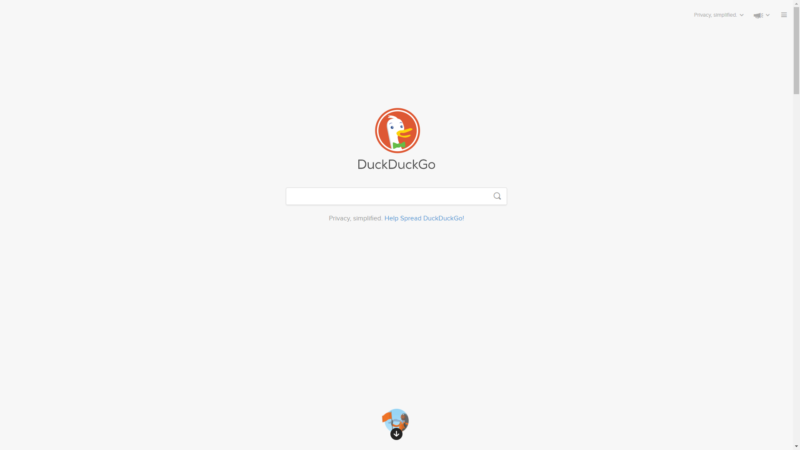
Pros:
- No tracking
- Privacy-based advertising
Cons:
- Uses Google & Bing results
If you’ve ever wondered which search engine does not track users, Years after its launch in 2008, DuckDuckGo has finally become the go-to private search engine. If you’re wondering which search engine does not track users, DuckDuckGo is the answer, since it’s known for delivering search results without keeping records of users’ search history or IP address or bombarding them with targeted ads.
The DuckDuckGo search engine collects a minimum of aggregate data that can’t be used to identify individual users. As for its advertising model, DuckDuckGo supports itself on ads produced by search terms alone, rather than a record of an individual’s search activities.
Since DuckDuckGo doesn’t collect user data, your results aren’t personalized to your interests. Many enjoy the convenience of tailored results, but if you care about privacy, it’s a small price to pay.
2. Startpage — Search Engine With an Inbuilt Encrypted Proxy Server
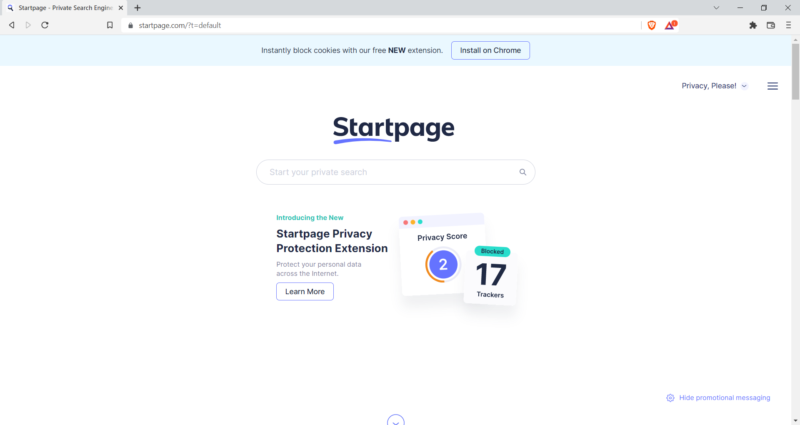
access websites through an encrypted proxy.
Pros:
- No data collection
- Search via encrypted proxy server
Cons:
- Based in a Nine Eyes country (the Netherlands)
Alongside DuckDuckGo, Startpage is a search engine that built its reputation on privacy. The two are comparable in their privacy and features, but there are key differences we’ll cover below.
Like DuckDuckGo, Startpage doesn’t track your personally identifiable information while you search. It doesn’t touch your search history, IP address, user agent string or anything that could be used to identify you. Its advertising model respects your privacy because each ad is based on your search phrase rather than a record of your behavior.
Startpage’s most notable feature is Anonymous View. Beside each link in its search results is an icon of a domino mask. Click the icon to open the web page in Anonymous View, which will access the website through an encrypted proxy server. The website will only see that Startpage is accessing the page, not an individual user. It works almost like a virtual private network (VPN).
We recommend using a VPN in combination with private search services for maximum privacy protection. Your internet service provider and third parties can still monitor your internet connection while using a private search website. Check out our article on the best VPNs for more information.
3. Ecosia — Most Environmentally Friendly Private Search Engine

Ecosia’s environmental projects.
Pros:
- Private search
- Supports environmental causes
Cons:
- Uses Bing’s index
Ecosia is the private search engine that plants trees. It’s run by a nonprofit company that uses 80% of its revenue to plant trees in 30 countries around the world. It not only supports environmental causes, it also keeps its hands off your personal data.
Ecosia states in its privacy policy that it anonymizes half your IP address, avoids unique event fingerprinting and transfers data over an SSL-secured connection. Ecosia runs ads from the Microsoft Bing ad network, but all ads are based on the user’s search terms rather than their search behavior. Furthermore, Ecosia doesn’t share or sell the data it collects to third parties.
4. Searx — Best Private Search Engine With Metasearch Option
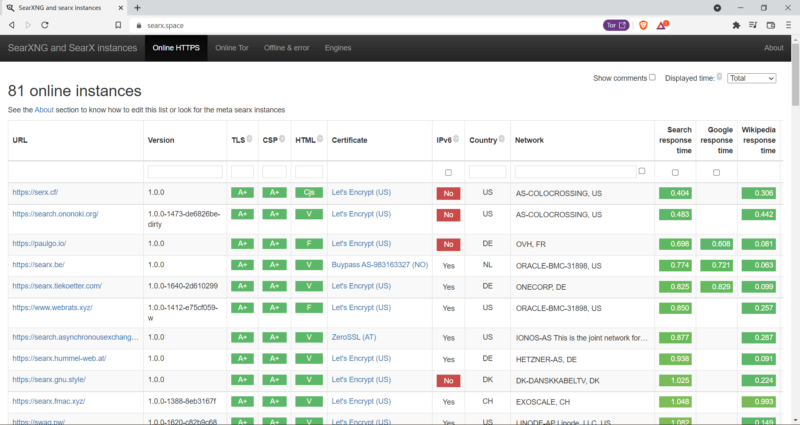
instances, or create your own.
Pros:
- No tracking
- Metasearch
- Open-source software
- Option to create instances
Cons:
- Difficult for beginners
Searx is a unique entry in this list. Unlike other private search engines, it’s a metasearch engine, which means it aggregates the results of several search engines at once — up to 70, in Searx’s case. It’s an open-source platform that meets high standards of privacy while providing a unique and customizable set of search results for every search term.
Searx isn’t a single search engine, but a platform of several instances run by many users. Each instance is configured to gather web pages from a wide selection of sources. If you don’t get relevant search results from one instance, you can use another. You can even make your own Searx instance if you don’t trust anyone else with your privacy.
5. Brave Search — Non-Tracking Search Engine With Its Own Private Browser
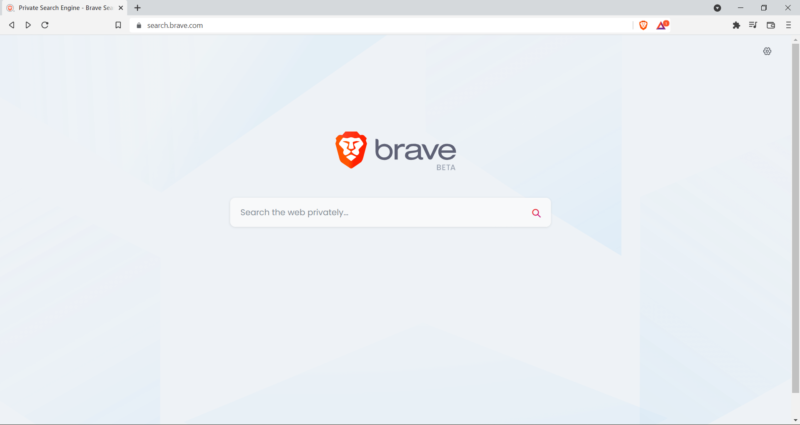
browser’s default search engine.
Pros:
- Private search
- Integrates with Brave’s browser
- Uses its own web crawlers & index
Cons:
- Sometimes sources from Google & Bing
- Still in beta phase
Brave is famous for creating a private browser and the company has expanded to include a search engine. Functional but still in the beta phase, Brave Search delivers content almost entirely from its independent index while keeping its hands off your data.
Every search results page contains an “independence metric,” which is the measurement of media from Brave’s index versus that of other sources, mainly Google and Bing.
Brave explains the vast majority of your searches originate from its own index, but content is occasionally pulled from other sources when Brave isn’t confident in the quality of its search results. No matter where your results are coming from, Brave Search keeps you from being tracked.
6. Swisscows (formerly Hulbee) — Private Search Engine Based in Switzerland
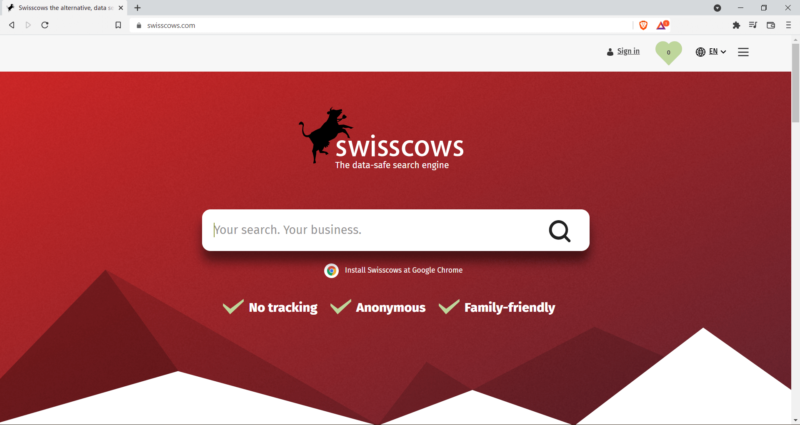
Pros:
- Private search
- Based outside the E.U. & U.S.
- Family-friendly results page
Cons:
- Times out often
Swisscows is a Switzerland-based search engine that respects your privacy. Not only does it refrain from storing search requests you submit, but its location means the company is beyond the reach of E.U. and U.S. data legislation, such as the GDPR and the CCPA.
It’s also not based in one of the Five, Nine, or 14 Eyes alliances, so the company is less likely to be the subject of government surveillance. Even if it was asked by the authorities to provide a record of user data, Swisscows would have nothing to give.
Swisscows is a great DuckDuckGo alternative as it offers an anonymous search engine that doesn’t keep an advertising profile on you or run ads. The interface is simple and clean and contains a “semantic map” of suggested search requests on the side. Swisscows also considers itself a family-friendly search engine as it filters out violent and adult content, similar to Google’s safe search feature.
7. Gibiru — Private Search Engine With 256-bit AES Encrypted Connection
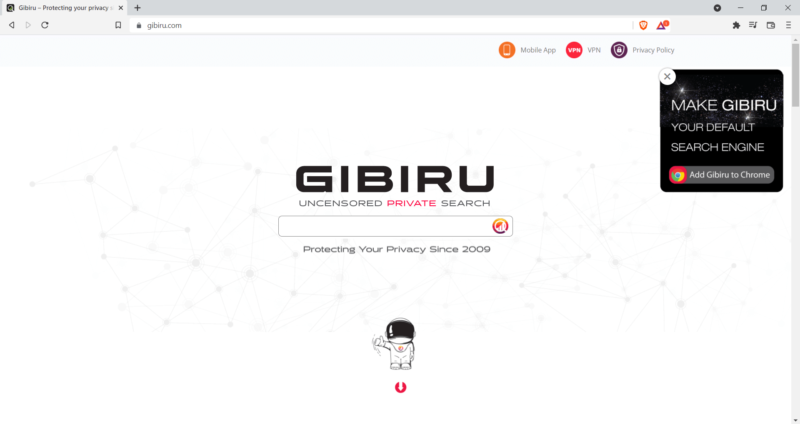
indexed by its big-name competitors.
Pros:
- Private web search
- 256-bit AES encryption
Cons:
- Little public information on the owners
The Gibiru search engine doesn’t collect IP addresses, cookies or history from its users. It does allow you to search over a 256-bit AES encrypted connection.
Not only is Gibiru private and secure, but it also includes content not found in the curated feeds of Google and other popular search engines. Your search request will return results in two columns: “all results” and — for everything omitted by mainstream search engines — “censored content.”
We like Gibiru’s privacy offerings, but we couldn’t find much about the team behind the search engine. We haven’t heard of any major privacy scandals involving Gibiru like we have with its mainstream competitors, but it would be nice to know more about the people providing the service.
Final Thoughts: Best Private Search Engine
That wraps up our list of the best private search engines. You don’t have to accept the privacy-violating practices of major search engines like Google as a fact of life. There are a lot of Google alternatives that keep your search queries and personal data private.
Search engines aren’t the only vector of privacy compromise that exists on the web. Good privacy begins with good habits. You can read more about developing good privacy habits in our anonymous browsing guide. We also have a guide on how to use DuckDucGo email protection for additional privacy.
What do you think are the best private search engines? Do you prefer basic search engines that protect your privacy, or do you like the metasearch capabilities of tools like Searx? Let us know what you think in the comments below, and as always, thanks for reading.
FAQ
There are many services that refrain from tracking your search queries and your personal information. DuckDuckGo is our favorite, but there are six other search engines on this list we recommend as well.
The only data DuckDuckGo collects is aggregate data that can’t be used to trace individuals, thus protecting user privacy.
Searx can pull content from up to 70 search engines at once from a multitude of user-run instances. There are a lot of search results that aren’t included in the curated feeds of the Google search engine and other tech giants. If you don’t like the results of one Searx instance, you can use another or create your own.

